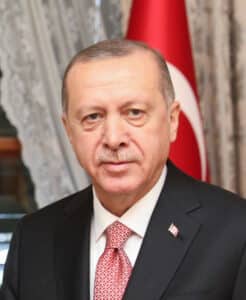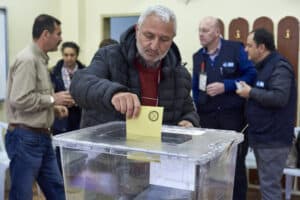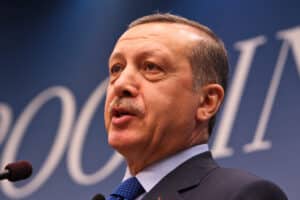Bron: Marko Djurica | REUTERS
Turkey still holds elections, has a parliament, and a formal opposition. But a closer look reveals that the political system has changed significantly in recent years. Under President Erdoğan, the space for opposition has steadily diminished. Journalists, judges, and political opponents face intimidation, prosecution, or censorship. The arrest of Ekrem İmamoğlu, mayor of Istanbul and future presidential candidate from the opposition CHP party, marked a new low point.
The Turkish government has now even banned the spreading of images and audio recordings of İmamoğlu. This move underscores the lengths Erdoğan is willing to go to maintain control and painfully illustrates how Turkey is slowly but surely shifting into what is known as a competitive authoritarian regime. This is also the analysis of Enno Maessen, assistant professor of political history at the University of Utrecht.
“Imprisoning İmamoğlu is a risky move,” says Maessen. He has been closely following developments in Turkey for years and describes the arrest as “an attempt to regain control of the situation, but not a well-considered one.” What does the İmamoğlu case tell us about the state of Turkish democracy? And how far does Erdoğan’s grip on the political system extend? In this article, Maessen offers his analysis of a country gradually sliding from democracy to autocracy.
From Atatürk’s legacy to Erdoğan’s system
The Republican People’s Party (CHP) is not just any opposition party; it is a major part of modern Turkish history. Founded by Mustafa Kemal Atatürk, the founder of the republic, the CHP was the dominant political force for decades. Maessen explains: “The CHP originated from the one-party system that was established during the founding of the republic.” Over the decades, the party has repeatedly transformed, evolving into a broader social-democratic movement. Today, however, the CHP is anything but uniform. According to Maessen, it is “a very mixed party, with both progressive and conservative currents.”
Under the leadership of Kemal Kılıçdaroğlu, the party shifted towards a more constructive opposition strategy in the early 2000s. “He wanted to expand the CHP’s influence, both locally and nationally.” This strategy had some effect: in cities like Istanbul and Ankara, the party eventually regained ground.
At the same time, a fundamental shift was taking place within the Turkish political system. When the AKP came to power in the early 2000s, many people hoped for a fairer and more democratic Turkey. Erdoğan promised reforms, economic growth, and better relations with Europe. He presented himself as a champion of ordinary citizens and freedom of speech. But those promises slowly gave way to an authoritarian consolidation of power. Step by step, he began bending the rules to his will. The judiciary was influenced, critical media were fined or taken over, and independent institutions lost their function.
Elections without a level playing field
According to Maessen, Turkey is now in a disturbing transitional phase. Where the political system could previously be qualified as a limited democracy, it is now moving towards what is known as a competitive authoritarian regime. In this, Maessen follows the analysis of his colleague Dr. Berk Esen. Elections still take place, and there is a formal opposition, but the playing field is far from fair. “Free elections are not necessarily fair elections,” Maessen warns.
Over the years, the AKP has concentrated power at all levels of government. “They have drawn so much influence toward themselves that you can no longer speak of a balanced political situation.” At the same time, the party has built a strong clientelist network. Through social support, promises, and subtle intimidation, the AKP tries to maintain its grip on the electorate. “People are told: if you don’t vote for us, your benefits or other support might be cut,” Maessen says.
İmamoğlu as a counterforce
In this context, İmamoğlu has emerged as a key figure of the opposition. As mayor of Istanbul, he proved that it is still possible to defeat the AKP in elections. His popularity and appeal go beyond the CHP’s traditional voter base, making him particularly threatening to Erdoğan.
Maessen calls İmamoğlu “the most important figure in the party, both formally and informally.” His arrest, officially for alleged corruption, is seen by many as a political decision. The charges sparked mass street protests, the largest since the Gezi uprising of 2013. Polls show that a significant portion of the Turkish population disagrees with İmamoğlu’s imprisonment. The widespread public reaction shows just how much he has become a symbol of resistance against the government’s increasingly authoritarian course.
The situation is similar to Erdoğan’s own arrest in 1999. Maessen points to the symbolism: “Many young people who now support İmamoğlu once stood on the same square in 1999 for Erdoğan.” Sarachane Park, located in a conservative part of Istanbul, has once again become the scene of protest. The fact that demonstrations are taking place there, Maessen argues, highlights how deeply public discontent has taken root. “The fact that within one generation people have to gather twice in the same place to support a victim of political repression is almost paradoxical.”
And what about Europe?
What is striking is the silence from Europe. Despite clear signs of democratic backsliding, geopolitical interests seem to outweigh principled objections. “The European Union’s role toward Turkey has been disgraceful for decades,” says Maessen. The war in Ukraine, migration deals, and defense interests ensure that Brussels continues to defend Erdoğan.
This attitude also brings long-term risks. Instability in Turkey could impact migration flows to Europe, economic relations, and political dynamics within NATO. Still, the willingness to take a firm stance toward Turkey remains minimal for now.
Turkish democracy is still alive, but under immense pressure. The İmamoğlu case shows how difficult it has become for opponents of the regime to speak out. Still, there are people who continue to rise up. Whether that will be enough for real change remains to be seen.



